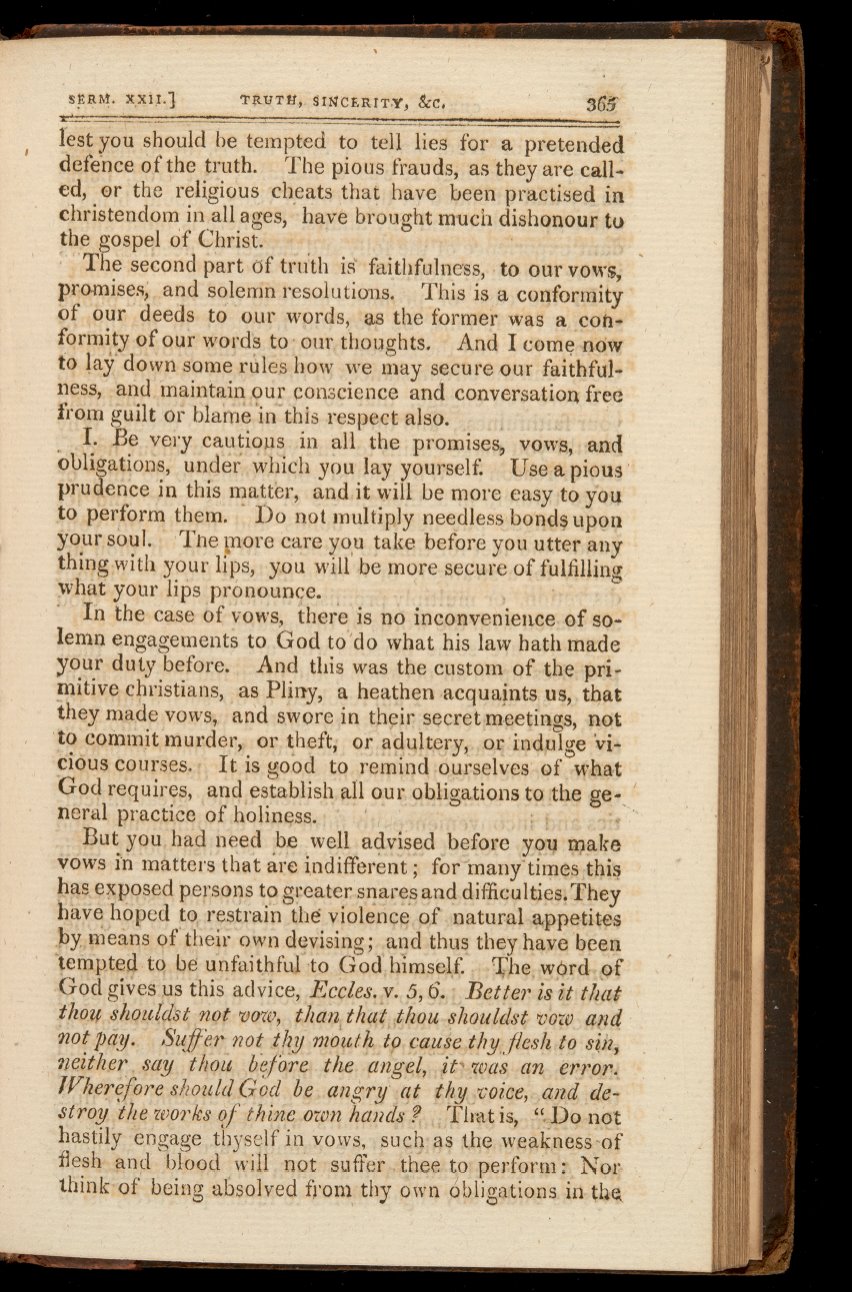

sxR.
RXII.]
TRUTfi, 9INCfiRITY,
&Cr
365
lest you
should
be
tempted
to tell
lies
for
a
pretended
defence
of
the truth.
The
pious frauds,
as they
are call-
ed,
or
the religious
cheats
that
have
been
practised
in
christendom
in all ages,
have
brought much dishonour to
the
gospel
of
Christ.
The
second
part of truth
is faithfulness, to
our
vows,
promises;
and
solemn
resolutions. This
is
a
conformity
of
our
deeds
to
our
words,
as
the former
was
a
con-
formity
of
our
words to
our thoughts. And
I
come
now
to
lay'
down some
rules
how
we
may
secure our faithful-
ness,
and
maintain
our
conscience and conversation free
from guilt or
blame
in
this
respect
also.
I.
Be
very
cautious
in
all
the promises,
vows,
and
obligations,
under
which you
lay
yourself.
Use
a pious
prudence
in
this
matter, and
it
will be
more easy
to
you
to
perform
them.
Do
not multiply needless bonds
upon
your
soul.
Tne more care
yo,u
take
before
you
utter
any
thing
with
your
lips,
you
will be
more secure
of
fulfilling
what your
lips
pronounce.
In
the
case
of
vows,
there
is
no
inconvenience
of
so-
lemn engagements to
God
to
do
what
his law
bath made
your
duty
before.
And
this
was
the custom
of
the
pri-
mitive christians,
as
Pliny,
a
heathen acquaints
us,
that
they
made
vows,
and
swore in
their secret
meetings,
not
to
commit
murder, or
theft, or
adultery,
or
indulge
'vi-
cious courses.
It
is
good to
remind
ourselves
of
what
God
requires, and establish
all
our
obligations to the
ge-
neral practice of
holiness.
But
you had need be
well
advised before
you
make
vows in
matters
that
are
indifferent;
for many'times this
has exposed
persons
to
greater
snares and
difficulties.
They
have hoped
to
restrain the violence
of natural
appetites
by
means
of
their
own
devising; and thus they have been
tempted
to
be
unfaithful
to
God
himself.
The
wOrd
of
God
gives us
this
advice, Eccles.
v.
5, 6.
Better
is
it
that
thou shouldst not
vow,
than
that
thou shouldst
vow
and
not pay.
Slifer
not thy
mouth
to
cause
thy.
flesh
to sin,
neither
say thou
be"
fore
the angel,
it-
was
an
error.
Wherefore
should God
be
angry at
thy
voice,
and
de-
stroy the
works
of
thine
own
hands? That
is,
Do
not
hastily engage
thyself
in vows,
such
as
the
weakness
of
flesh
and
blood
will
not
suffer thee to
perform
:
Nor
think
of
being absolved from thy own
obligations
in
tbQ

















